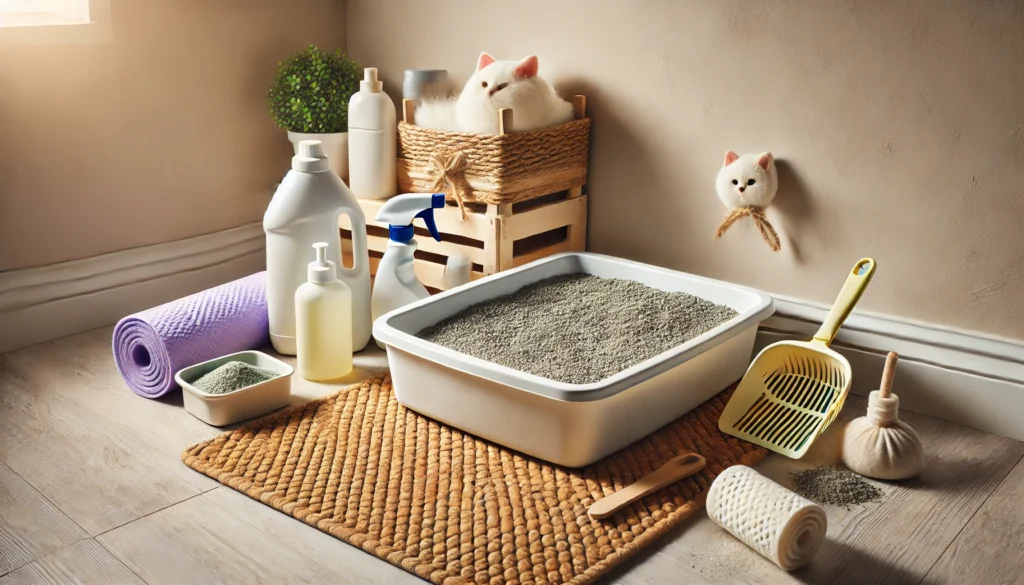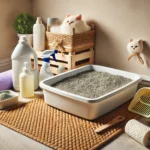Maintaining a clean, odour-free litter box is essential for your cat’s comfort and hygiene. A clean litter box not only keeps your home smelling fresh but also encourages consistent use by your cat. Here’s a guide on how to manage your cat’s litter box effectively, with tips to control odours and maintain cleanliness.
Why a Clean Litter Box Matters
A clean litter box benefits both you and your cat:
- Encourages Consistent Use: Cats are particular about cleanliness and may avoid a dirty litter box.
- Reduces Odours: Regular cleaning prevents unpleasant smells from lingering in your home.
- Promotes Health: Cleanliness helps prevent issues like infections or respiratory discomfort from poor hygiene.
Essential Litter Box Cleaning Tips
1. Scoop Daily
Daily scooping is one of the simplest yet most effective ways to keep the litter box clean and reduce odours.
- Use a Quality Scoop: Choose a sturdy scoop that makes it easy to sift and remove clumps.
- Check Twice Daily: Scoop in the morning and evening if you have multiple cats or a single high-traffic box.
- Dispose Properly: Use sealed bags or an odour-controlled trash can to prevent smells from spreading.
2. Change the Litter Weekly
Even with daily scooping, it’s important to change the litter entirely to refresh the box.
- Empty Completely: Dump all litter, clean the box thoroughly, and add fresh litter once a week.
- Adjust for Multiple Cats: If you have more than one cat, consider a twice-weekly change.
- Use Fresh Litter: Fill the box with a 2-3 inch layer of fresh litter for optimal odour control.
3. Clean the Box Monthly
Monthly deep cleaning removes bacteria and residue that may build up over time.
- Mild Soap and Water: Wash the box with mild, unscented soap and warm water. Avoid harsh chemicals like bleach.
- Rinse Thoroughly: Ensure no soap residue remains, as cats may be sensitive to lingering scents.
- Dry Completely: Dry the box thoroughly before adding fresh litter to prevent clumping and odours.
4. Use High-Quality Litter
The type of litter you use plays a big role in managing odour and maintaining a clean box.
- Clumping Litter: Clumping litter makes it easy to scoop and keeps the box cleaner for longer.
- Odour-Absorbing Litter: Look for litter with natural odour-absorbing agents, such as baking soda or activated charcoal.
- Low-Dust Options: Low-dust or dust-free litter is healthier for both you and your cat, reducing respiratory irritation.
Additional Tips for Odour Control
1. Place the Litter Box in a Well-Ventilated Area
Good ventilation helps disperse odours and keeps the area fresh.
- Avoid Closed Spaces: Avoid placing the litter box in a cramped area or closet where odours can concentrate.
- Use Air Fresheners Carefully: Avoid strong, chemical air fresheners, as cats are sensitive to scents. Opt for natural options like baking soda.
- Open Windows: If possible, place the litter box in a room with windows to allow fresh air to circulate.
2. Add Baking Soda for Extra Freshness
Baking soda is a safe and natural odour neutraliser that you can add to your cat’s litter.
- Sprinkle a Layer: Add a thin layer of baking soda at the bottom of the box before adding litter.
- Mix with Litter: Lightly mix the baking soda into the litter to distribute it evenly.
- Replace Regularly: Add fresh baking soda each time you change the litter to maintain effectiveness.
3. Consider a Self-Cleaning Litter Box
Self-cleaning litter boxes can make maintenance easier, especially for households with multiple cats.
- Automatic Scooping: These boxes scoop themselves after each use, keeping litter fresh without manual scooping.
- Odour Control Features: Many self-cleaning boxes have odour control mechanisms, such as carbon filters.
- Consider Investment: While self-cleaning boxes are more expensive, they can save time and reduce odour effectively.
4. Use a Litter Mat to Catch Debris
A litter mat placed outside the box helps reduce mess and prevents litter from spreading.
- Choose a Large, Textured Mat: A larger mat with texture helps capture litter from your cat’s paws.
- Shake Out Weekly: Shake out or vacuum the mat weekly to keep the area around the litter box clean.
- Wash Monthly: Wash the mat monthly to prevent any lingering odours or bacteria.
Managing Litter Box Issues
If you notice your cat avoiding the litter box or any unusual odours, it may indicate a problem.
1. Address Litter Box Aversion
Litter box avoidance can be due to cleanliness, location, or stress.
- Clean Regularly: Ensure the box is cleaned consistently, as dirty litter boxes can deter use.
- Try Different Litter: Experiment with different types of litter if your cat seems unhappy with the current one.
- Create a Safe Space: Place the litter box in a quiet, low-traffic area to reduce stress.
2. Monitor for Health Issues
Strong odours or changes in bathroom habits may indicate a health issue in your cat.
- Check for Changes in Urine or Stool: Monitor for any unusual odours, colour, or consistency in waste.
- Look for Signs of Discomfort: Straining, frequent trips, or vocalising during use may indicate health concerns.
- Consult a Vet: If you notice any changes, consult your vet to rule out underlying health issues.
Conclusion: A Fresh, Clean Litter Box for a Happy Cat
Maintaining a clean and odour-free litter box is essential for your cat’s comfort and well-being. By scooping daily, cleaning regularly, and using odour control methods, you’ll provide a pleasant environment that encourages consistent use. With these tips, you’ll ensure your home stays fresh, and your cat remains happy and healthy.

Meet Claudia Boaski, an enthusiast in pet care, plants, and home wellness. She is dedicated to helping people create harmonious and welcoming homes, fostering a deep connection with nature and their furry companions.








Thank you very much for all the tips, they are very important and will help me a lot.
Hello, LÍNDICE COUTO!
We’re so pleased to know that the tips have been helpful to you. It’s always rewarding to hear that our content is making a difference in caring for your pets. Do keep following the blog, as we regularly share new suggestions and practices to make daily life easier and ensure the well-being of our four-legged friends.
If you have any questions or suggestions for topics, feel free to share! 😊